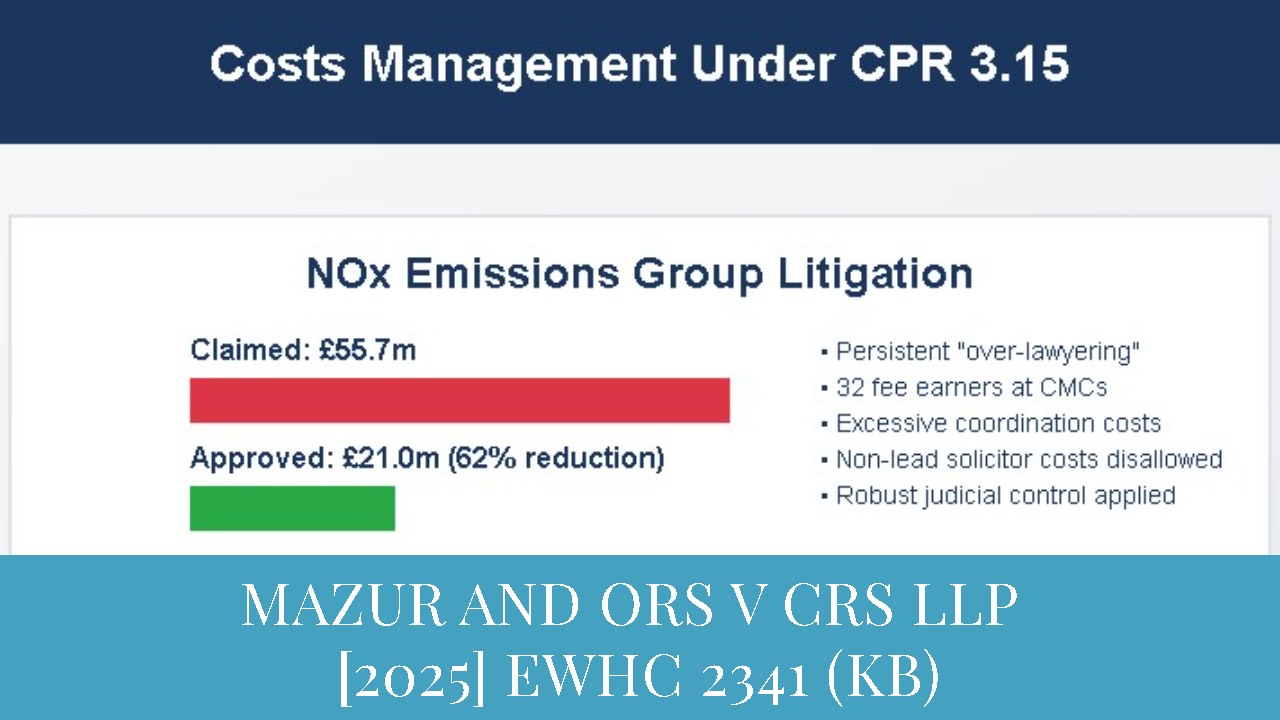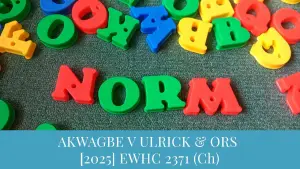Background
Carl v Hawkins & Ors [2025] EWHC 1104 (Ch) involved a protracted litigation over several unrelated issues, with the core contention revolving around alleged dishonest misappropriation of funds by the defendants, among other claims. Mr Bernard Jacob Carl (“the Claimant”) instituted the proceedings against Mr John Hawkins and multiple other defendants, alleging various forms of wrongdoing. During the course of the litigation, numerous procedural steps were undertaken, culminating in the present costs determination hearing.
Over the years, several interlocutory applications and hearings took place, and multiple defendants either represented themselves or did not actively participate. At the main hearing, Mr Carl, who represented himself, sought various forms of relief, including monetary compensation and proprietary claims over certain assets allegedly acquired with his misappropriated funds. The judgment resulted from a sequence of judicial directions, applications, and interim orders, including a significant pre-trial adjournment ordered by ICC Judge Briggs in June 2021 due to widespread noncompliance with court orders. This led to the present hearing on costs and related issues.
Costs Issues Before the Court
Several costs issues were adjudicated by Mr Simon Gleeson in this judgment:
- The Claimant’s request for costs recovery, particularly against the defendants found liable for dishonest receipt and assistance.
- Interim costs orders arising from prior hearings, including the order issued by ICC Judge Briggs on 18 June 2021 requiring the Claimant to bear costs thrown away due to the adjournment.
- Claimant’s application for sanctions against some defendants for procedural noncompliance, particularly concerning adherence to pre-action protocols.
- Determination of costs following the mixed success in various interconnected claims, notably between the Claimant and Mrs Edwards.
- Interest claims relating to the alleged misappropriation of funds and contractual interest under the Bill of Sale.
- Reduction in costs due to the conduct of the litigation by the Claimant.
The Parties’ Positions
The Claimant, Mr Carl, sought recovery of substantial costs incurred throughout the litigation. He submitted detailed objections to costs claimed by Defendants, particularly regarding the interim costs order resulting from the Briggs hearing. His overarching argument was that costs claimed as “thrown away” were overstated since much of the work performed could be reused in subsequent hearings.
Mrs Edwards, a significant respondent in these proceedings, argued for her costs associated with successful defenses in the main action, while disputing liability for costs in the cheque action. Her position emphasized the complexities due to partial success in different facets of the litigation.
Mr Limbani sought recovery of his costs despite an earlier finding by Simon Gleeson debarring him from recovering costs due to perceived non-cooperative and strategically obstructive conduct during the main action. He additionally sought sanctions against Mr Carl for alleged breaches of pre-action protocols, arguing undue prejudice due to lacking pre-action correspondence and early involvement of legal representation.
Both parties also disputed various elements of interest claims, especially concerning the application of enhanced rates and compounding for pre-judgment interest as well as contractual interest claims under a Bill of Sale.
The Court’s Decision
Mr Simon Gleeson delivered a detailed and nuanced judgment addressing each costs issue:
Regarding the interim costs order from the Briggs hearing, he held that costs “thrown away” are not universally defined but generally relate to costs incurred that are genuinely wasted due to noncompliance or procedural failings. The court rejected any immediate payment on account to Mrs Edwards and Mr Limbani due to unresolved disputes over the quantum of costs genuinely wasted.
Regarding the Claimant’s procedural conduct, particularly regarding pre-action protocols, the court held that the failure to send a pre-action letter to Mr Limbani was reasonable and proportionate under the circumstances, given the likelihood of non-engagement and lack of beneficial pre-litigation negotiation. Therefore, no sanctions were imposed against Mr Carl for procedural breaches.
Interest claims were scrutinised, and the court applied the statutory investment rate (1% above the Bank of England base rate) for pre-judgment interest, rejecting an enhanced rate based on the Claimant’s refinancing costs. Equitable interest was ordered in respect of dishonest receipt claims, applying a compensatory rationale rather than a punishment.
Complex cross-claims for costs, particularly between Mr Carl and Mrs Edwards, required detailed assessment due to the mixed success. The court ordered detailed assessment by a costs judge following rejection of simplistic allocation approaches.
Finally, the court upheld a 40% reduction in Mr Carl’s overall costs claim due to disruptive litigation conduct, maintaining that the claimant, who chose to proceed without legal representation, bore substantial responsibility for case management difficulties. A proportionate approach was ordered to mitigate unintended financial ramifications.

![Carl v Hawkins & Ors [2025] EWHC 1104 (Ch)](https://tmclegal.co.uk/wp-content/uploads/2025/05/shutterstock_2352625911-1000x630.webp)
![FERNANDEZ V FERNANDEZ [2025] EWHC 2373 (Ch)](https://tmclegal.co.uk/wp-content/uploads/2025/09/Willis-Title-copy-copy-copy-copy-6.jpg)


![STOCKLER AND ANOTHER V THE CORPORATION OF THE HALL OF ARTS AND SCIENCES [2025] EWHC 2262 (SCCO)](https://tmclegal.co.uk/wp-content/uploads/2025/09/YT-Thumb-300x169.webp)











![Sanrose Investment Ltd v Foley & Ors [2025] EWHC 1071 (Ch)](https://tmclegal.co.uk/wp-content/uploads/2025/05/shutterstock_1721205958-80x80.webp)
![Alta Trading UK Ltd & Ors v Bosworth & Ors [2025] EWHC 1097 (Comm)](https://tmclegal.co.uk/wp-content/uploads/2025/05/iStock-1446190449-80x80.webp)